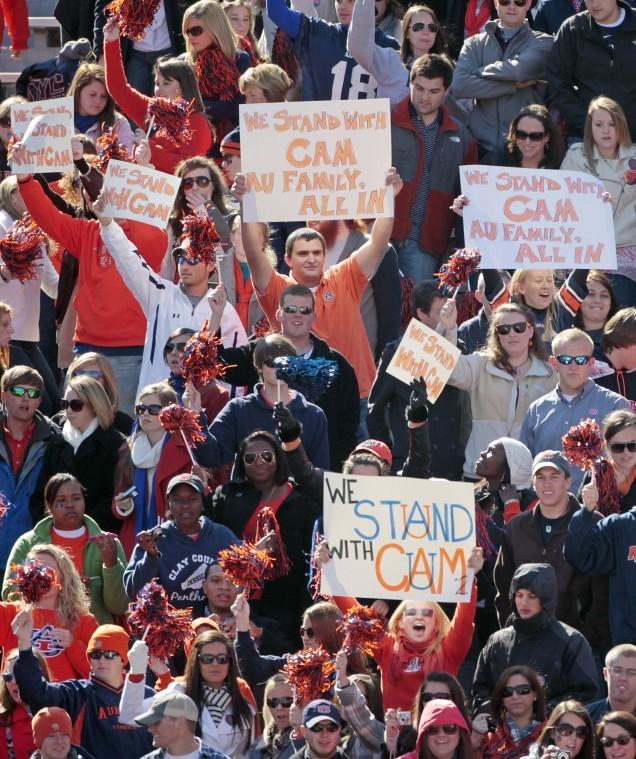Benefits for NCAA athletes practically tradition
This Nov. 6, 2010 file photo shows Auburn fans showing their sentiments to the Cameron Newton investigation by the NCAA over his recruitment, prior to an NCAA college football game against Chattanooga at Jordan-Hare Stadium in Auburn, Ala. The Auburn Tigers found themselves defending quarterback Cam Newton for the second time in five days, this time adamantly sticking up for the Heisman hopeful in the wake of allegations of academic cheating when he was at Florida.
November 15, 2010
When it comes to traditional values of college athletics, nothing is more organic to the institution than giving illegal benefits to players.
Auburn quarterback Cam Newton is currently under a fire storm of allegations that have neither been confirmed nor denied by the junior signal caller. The allegations state that Newton’s father, Cecil, sought money from Mississippi State during the recruiting process.
If the allegations are proven to be a true, a turn of events that wouldn’t shock anybody familiar with college recruiting, the NCAA will undoubtedly come down hard on the junior. Giving the organization a chance to puff out its chest and proudly state that it has snuffed out the lone evil doer that had been sullying the good name of collegiate athletics.
It would have been one thing if the century old organization did some investigating and came up with the allegations on its own.
Instead the NCAA had been sitting on the allegations ever since January when according to ESPN, Mississippi State reported Newton’s father Cecil for telling recruiters it would take, “more than a scholarship” for his son’s services.
Luckily, the NCAA got around to it, because they do care after all. It’s not like a delayed reaction from the organization has ever happened before. Oh, wait.
Didn’t former USC running back Reggie Bush originally get reported for receiving illegal benefits in 2006? Four years before the Saints running back gave back his Heisman trophy.
Is it not a little curious that the NCAA didn’t even get involved in the investigation until Bush left college for the NFL?
Suggesting that the NCAA knew about and ignored the Bush violations would be extremely presumptuous, but isn’t it possible that the organization had no desire to snoop around the USC locker room for potential violations. The NCAA is after all a business, and to go around looking for things to make your business look bad in the eyes of the public is just bad form.
USC and Auburn are not trendsetters. Illegal benefits date back to at least the 1960s’.
Max Williams, general manager and coach of the ABA’s Dallas Chaparrals from 1969 to 1971, was quoted in Terry Pluto’s, “Loose Balls: The Short, Wild Life of the American Basketball Association.” Williams spoke of the illegal benefits college basketball players were receiving on campuses all across the country.
“Notre Dame’s Johnny Dee, Head of the NCAA Basketball Coaches Association wrote letters to every major coach to not allow ABA scouts on their campuses,” Williams said. “George Mikan [ABA Commissioner] contacted the general managers of every ABA team and told us to ask our players what they got over their scholarships [illegal benefits]. On our team, all but two players were getting extras-payoffs, cars, things like that at college. Mikan then contacted the NCAA Coaches Association and said he would make all the information public if they didn’t back off the ABA scouts. Right after that, the letter banning the ABA was withdrawn.”
The American public has to accept the fact that it would make little sense from the NCAA’s point of view to uproot every shady practice in college sports. History tells us illegal benefits are a time-honored tradition in college sports and unless college aged kids suddenly lose interest in money, you can bet your bottom dollar the practices will continue.







